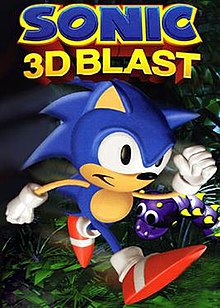| Sonic 3D Blast | |
|---|---|
 | |
| Developer(s) | |
| Publisher(s) | Sega |
| Director(s) | Takao Miyoshi |
| Producer(s) |
|
| Designer(s) |
|
| Programmer(s) |
|
| Artist(s) | James Cunliffe |
| Composer(s) |
|
| Series | Sonic the Hedgehog |
| Platform(s) | |
| Release | |
| Genre(s) | Platform |
| Mode(s) | Single-player |
Sonic 3D Blast[b], known in PAL regions as Sonic 3D: Flickies' Island,[c] is a 1996 platform game in the Sonic the Hedgehog series for the Sega Genesis and Sega Saturn. As Sonic the Hedgehog, the player embarks on a journey to save the Flickies, birds enslaved by Doctor Robotnik. The player must guide Sonic through a series of themed levels to collect Flickies and defeat Robotnik. Though it retains game mechanics from prior Sonic games, Sonic 3D Blast is differentiated by its 2D isometric perspective, with pre-rendered 3D models converted into sprites.
The concept for Sonic 3D Blast originated during the development of Sonic the Hedgehog 3 (1994). Most of the programming was outsourced to the British studio Traveller's Tales, as the Japanese Sonic Team staff was preoccupied with Nights into Dreams (1996). Development lasted eight months, and the team drew inspiration from Donkey Kong Country (1994) and Sonic Labyrinth (1995). Sonic 3D Blast was developed alongside the Saturn game Sonic X-treme. When X-treme was canceled, Sega commissioned a port of 3D Blast featuring improved graphics for the Saturn.
Both versions were published by Sega in November 1996, with a Windows port released the following year. Sonic 3D Blast was the final Sonic game for the Genesis, and has been re-released through Sonic compilations and digital distribution platforms. The game was commercially successful and received positive reviews for the Genesis version; critics welcomed the new gameplay style as well as the graphics and music. Subsequent releases were met with more mixed reviews, with the Saturn version being seen as too similar to the Genesis version. Retrospective reviews criticized the isometric gameplay, controls, and pace, although reception to the visuals and soundtrack remained positive. An unofficial director's cut version, featuring adjusted gameplay elements and improved controls, was released by the Genesis version's lead programmer, Jon Burton, in 2017.
Cite error: There are <ref group=lower-alpha> tags or {{efn}} templates on this page, but the references will not show without a {{reflist|group=lower-alpha}} template or {{notelist}} template (see the help page).
- ^ "Sonic 3D Blast". December 15, 1996. Archived from the original on December 15, 1996. Retrieved November 15, 2023.
- ^ Johnston, Chris (September 16, 1997). "Sonic Lands on PC". GameSpot. Archived from the original on October 6, 2000. Retrieved December 5, 2019.